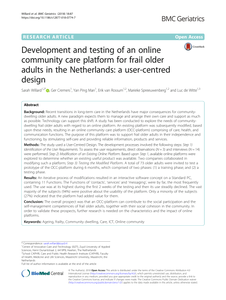We present a fully working prototype of NOOT, an interactive tangible system which supports (sharing of) moments of reflection during brainstorms. We discuss the iterative design process, informed by embodied situated cognition theory and by user studies in context using various versions of the prototype. Apart from a potentially useful product, NOOT served as a research-tool showing how physical materials and social interactions scaffold people’s sense-making efforts, and how technology might fit in to support this process.
DOCUMENT

Background: During the process of decision-making for long-term care, clients are often dependent on informal support and available information about quality ratings of care services. However, clients do not take ratings into account when considering preferred care, and need assistance to understand their preferences. A tool to elicit preferences for long-term care could be beneficial. Therefore, the aim of this qualitative descriptive study is to understand the user requirements and develop a web-based preference elicitation tool for clients in need of longterm care. Methods: We applied a user-centred design in which end-users influence the development of the tool. The included end-users were clients, relatives, and healthcare professionals. Data collection took place between November 2017 and March 2018 by means of meetings with the development team consisting of four users, walkthrough interviews with 21 individual users, video-audio recordings, field notes, and observations during the use of the tool. Data were collected during three phases of iteration: Look and feel, Navigation, and Content. A deductive and inductive content analysis approach was used for data analysis. Results: The layout was considered accessible and easy during the Look and feel phase, and users asked for neutral images. Users found navigation easy, and expressed the need for concise and shorter text blocks. Users reached consensus about the categories of preferences, wished to adjust the content with propositions about well-being, and discussed linguistic difficulties. Conclusion: By incorporating the requirements of end-users, the user-centred design proved to be useful in progressing from the prototype to the finalized tool ‘What matters to me’. This tool may assist the elicitation of client’s preferences in their search for long-term care.
DOCUMENT

Background: Recent transitions in long-term care in the Netherlands have major consequences for community- dwelling older adults. A new paradigm expects them to manage and arrange their own care and support as much as possible. Technology can support this shift. A study has been conducted to explore the needs of community- dwelling frail older adults with regard to an online platform. An existing platform was subsequently modified, based upon these needs, resulting in an online community care platform (OCC-platform) comprising of care, health, and communication functions. The purpose of this platform was to support frail older adults in their independence and functioning, by stimulating self-care and providing reliable information, products and services. Methods: The study used a User-Centred Design. The development processes involved the following steps: Step 1) Identification of the User Requirements. To assess the user requirements, direct observations (N = 3) and interviews (N = 14) were performed. Step 2) Modification of an Existing Online Platform. Based upon Step 1, available online platforms were explored to determine whether an existing useful product was available. Two companies collaborated in modifying such a platform; Step 3) Testing the Modified Platform. A total of 73 older adults were invited to test a prototype of the OCC-platform during 6 months, which comprised of two phases: (1) a training phase; and (2) a testing phase. Results: An iterative process of modifications resulted in an interactive software concept on a Standard PC, containing 11 Functions. The Functions of ‘contacts’, ‘services’ and ‘messaging’, were by far, the most frequently used. The use was at its highest during the first 2 weeks of the testing and then its use steadily declined. The vast majority of the subjects (94%) were positive about the usability of the platform. Only a minority of the subjects (27%) indicated that the platform had added value for them. Conclusion: The overall prospect was that an OCC-platform can contribute to the social participation and the self-management competencies of frail older adults, together with their social cohesion in the community. In order to validate these prospects, further research is needed on the characteristics and the impact of online platforms.
MULTIFILE

The findings suggests that participation in music practices can significantly support caregivers' and nurses' contact with the people to whom they give care and the healthcare professionals' insights into the patients' and residents' personhood. Music can create experienced changes in the care environment through kairotic moments of connectivity and intimacy of the musical interaction. The music sessions support and reinforce the person-centred values of care delivery.The meaning of participatory music practices for the well-being and learning of healthcare professionals working with ageing patients and nursing home residents.